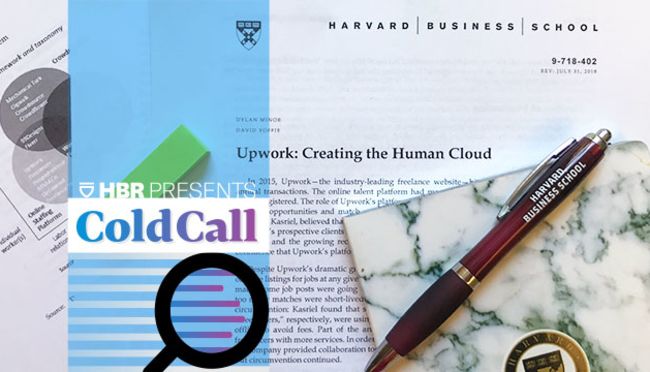
- 19 Oct 2022
- Op-Ed
Cofounder Courtship: How to Find the Right Mate—for Your Startup
Like any other long-term partnership, choosing the right cofounder is a complicated decision with big implications for a venture. Julia Austin offers practical advice for entrepreneurs who are searching for "the one."

- 25 Jun 2019
- Cold Call Podcast
In the Platform Economy, Upwork Searches for Better Matches in the Cloud
Welcome to the Platform Economy, where business strategists must learn a new form of competition. David Yoffie and Michael Cusumano explain choices facing Upwork, which matches jobs with job hunters in the cloud. Open for comment; 0 Comments.

- 26 Mar 2019
- Working Paper Summaries
Managed Ecosystems and Translucent Institutional Logics: Engaging Communities
Organizations increasingly rely on engagement with external communities of contributors. This paper explores transitions to a managed-ecosystem governance mode and its implications for strategy and innovation. To be successful, firms must develop the capabilities to shepherd communities, leverage without exploiting them, and share intellectual property rights.
- 22 Dec 2016
- Op-Ed
The Small Business Administration is a Model for How to Drive Economic Growth
Responding to a recent editorial in the Washington Post, Karen Mills argues that the Small Business Administration is an effective public-private partnership model that fuels economic growth, access, and opportunity for all Americans. Open for comment; 0 Comments.
- 18 Jul 2016
- Research & Ideas
Is Greed Ruining Private Equity Firms?
In a first-ever look at the internal economics driving private equity partnerships, Victoria Ivashina and Josh Lerner find that founding partners who take an unequal share of the pie can ruin their firms. Open for comment; 0 Comments.

- 03 May 2016
- Working Paper Summaries
Pay Now or Pay Later? The Economics within the Private Equity Partnership
Partnerships are essential to the professional service and investment sectors. Yet the partnership structure raises issues including intergenerational continuity. This study of more than 700 private equity partnerships finds 1) the allocation of fund economics is typically weighted toward the founders of the firms, 2) the distributions of carried interest and ownership substantially affect the stability of the partnership, and 3) partners’ departures have a negative effect on private equity groups’ ability to raise additional funds.

Can Remote Surgeries Digitally Transform Operating Rooms?
Launched in 2016, Proximie was a platform that enabled clinicians, proctors, and medical device company personnel to be virtually present in operating rooms, where they would use mixed reality and digital audio and visual tools to communicate with, mentor, assist, and observe those performing medical procedures. The goal was to improve patient outcomes. The company had grown quickly, and its technology had been used in tens of thousands of procedures in more than 50 countries and 500 hospitals. It had raised close to $50 million in equity financing and was now entering strategic partnerships to broaden its reach. Nadine Hachach-Haram, founder and CEO of Proximie, aspired for Proximie to become a platform that powered every operating room in the world, but she had to carefully consider the company’s partnership and data strategies in order to scale. What approach would position the company best for the next stage of growth? Harvard Business School associate professor Ariel Stern discusses creating value in health care through a digital transformation of operating rooms in her case, “Proximie: Using XR Technology to Create Borderless Operating Rooms.”